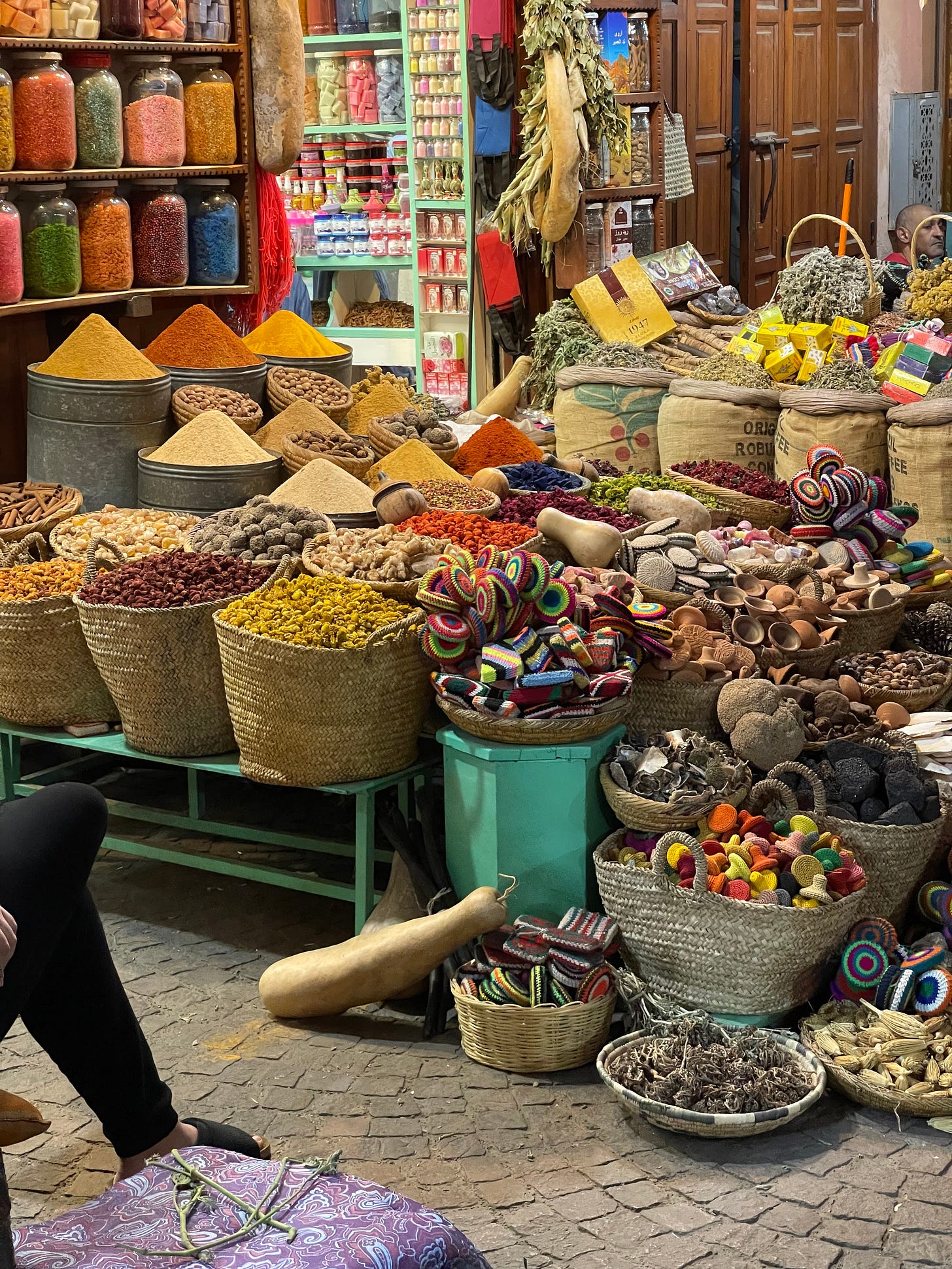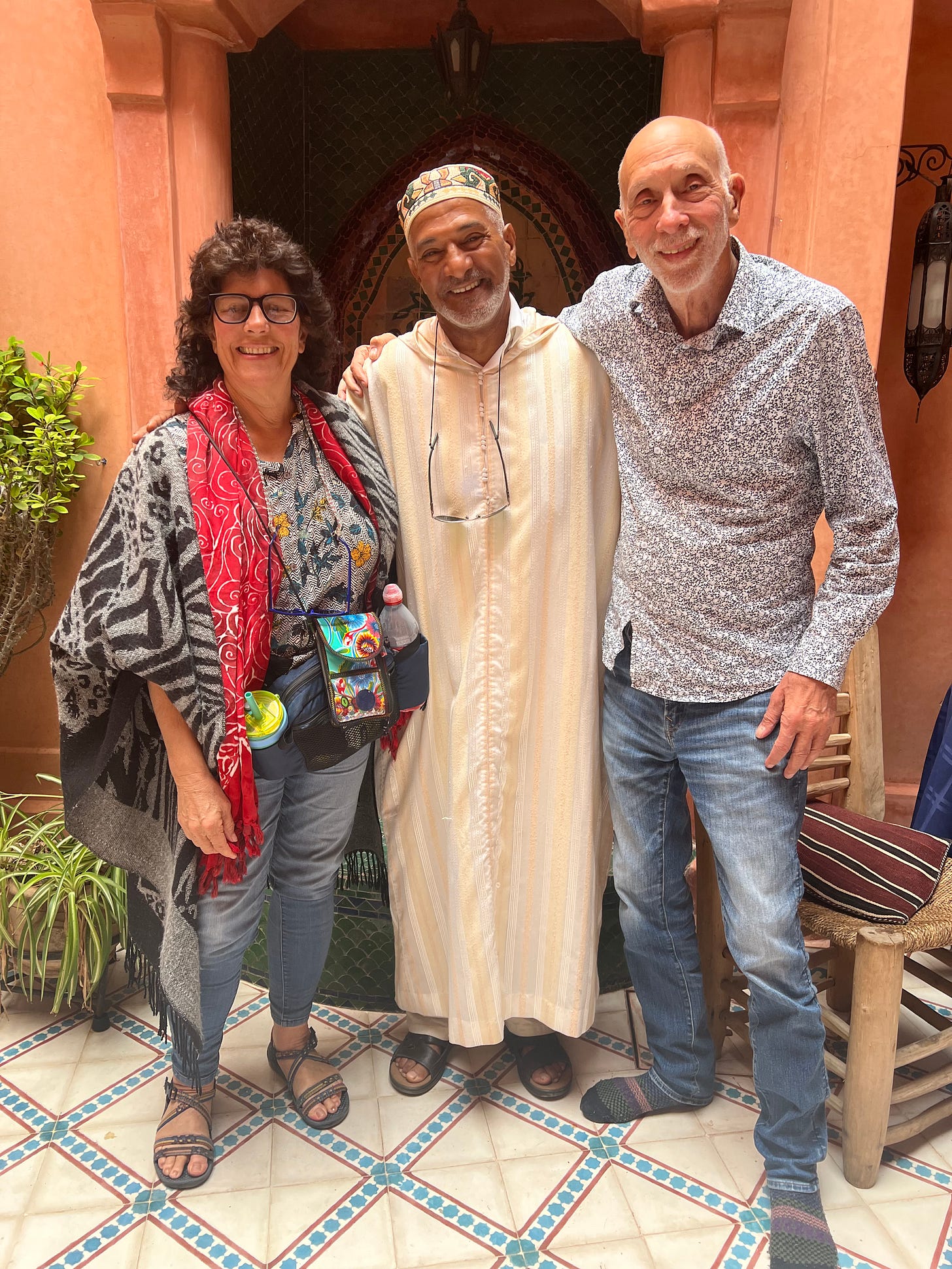A Postcard from Marrakech
Welcome to a vibrant tapestry of ancient cities, colorful souks, and rich cultural traditions blending Arab, Berber, and Mediterranean influences
I write from a riad, our friends’ Joel and Sindie’s home in Marrakech, an amazing city deep in the heart of Morocco. Morocco is very different — and it’s something you feel almost the minute you arrive. Here’s why:
Morocco sits at the meeting point of Africa, Europe, and the Middle East. It has soaked up influences from all three — but in doing so, it transformed them into something uniquely Moroccan. Roman ruins, Arab calligraphy, Berber villages, Andalusian gardens, French boulevards — all coexist. Yet instead of feeling like a patchwork, Morocco feels seamless. It’s a land of bridges, not borders.
In Morocco, history isn’t locked in a museum. You live inside it. The medinas (old city centers) of Fez, Marrakech, and Essaouira aren’t preserved for tourists — they’re bustling with daily life. A thousand-year-old door might lead to someone’s modern apartment. A medieval fountain still supplies water. The past isn’t just respected here — it’s alive, woven into everyday life.
Moroccan hospitality is sacred. If you visit someone’s home, you’ll be treated like a king — mint tea, sweets, and deep warmth. It’s not surface politeness. It’s rooted in centuries-old traditions of tribal life, where survival depended on generosity and welcoming the stranger. Even in chaotic cities, there’s a deep sense of human connection that’s rare elsewhere.
There’s a spiritual, almost mystical hum beneath daily life in Morocco. It’s in the calls to prayer echoing over the rooftops. It’s in the sufi songs, the trance rituals of Gnawa music, the ancient talismans in market stalls. It’s a place where magic — real or imagined — is treated with respect. Dreams, signs, and omens are taken seriously. Rationality exists, but it’s not the only way of knowing.
Morocco is designed to overwhelm your senses. The intricate mosaics, the vibrant spices, the bright cloths in the souk, the endless patterns. Beauty isn’t considered a luxury here — it’s considered essential. Even the humblest home might have hand-painted tiles. The philosophy seems to be: if you’re going to exist, exist beautifully.
Morocco was never fully conquered by the Ottomans. It negotiated with Europe but remained largely intact. It fought off colonialism. It has always maintained a strong, proud sense of being itself. Even today, Moroccans are deeply aware that they are something distinct — Arab, Berber, African, Mediterranean — but also something else: Moroccan.
Morocco is ancient, yes — but it’s not stuck. Young people are creating art, music, startups, while still respecting Ramadan, couscous Fridays, and village weddings. It’s a society of constant negotiation between the old and the new, but without the aggressive rupture you often see elsewhere.
Morocco feels different because it never let itself be flattened.
It remains layered, living, luminous, complicated — just like the intricate patterns of its zellige tiles.
In Morocco, the air itself hums — with the songs of coppersmiths, the rattle of donkey carts, the scent of orange blossoms and diesel, stitched into one breath.
The cities are not built; they are woven —threads of sandstone, indigo, prayer, and bargaining laughter.
You don’t walk through a medina — you swim through it, past ancient doors that sigh open to reveal tiled gardens and secrets too old to name.
Here, time does not flow like a river — it pools and shimmers, eddying in the corners of tea shops and between the calls to prayer.
A boy races a shadow down a stone alley; an old man sits perfectly still, watching, remembering. Both belong to the same moment.
The mountains crackle under stars so close you could reach up and steal one.
The desert speaks in gusts that erase your footprints the moment you leave them.
The sea beats its slow drum against a fortress wall built by pirates and dreamers.
Everywhere, there is color: woven into carpets, glazed into tiles, pinned into scarves, sung into the sky by the calls of a thousand market stalls.
It’s a feast for the soul, and the soul learns to be hungry.
And in the spaces between — the silent, gold-tinted spaces — you might hear it: the soft heartbeat of something ancient, stubborn, and beautiful, refusing to disappear.
Morocco does not ask you to understand it.
It asks you to feel it.
And if you do — if you truly do — it never lets you go.
Our friends have a lovely riad, where we are staying. From the dusty, twisting alleys, you duck through a small, plain door — and step into another world. The noise outside falls away, muffled by thick ancient walls.
You find yourself standing in a cool, sun-dappled courtyard, where orange trees reach lazily toward a patch of blue sky. A fountain hums softly at the center, its droplets catching the light like tiny stars.
The air smells of mint, rosewater, and the faint memory of last night’s spices.
The rooms are not rooms; they are sanctuaries — arched doorways, carved cedar, mosaics that spiral and bloom under your fingertips.
Every surface is alive with pattern, color, care — even the shadows paint lacework on the floors.
Someone brings you mint tea on a silver tray, poured high so the liquid breathes and the glass sweats in your hand. The first sip is sweet and sharp, a quiet explosion of life.
At night, candles and lanterns turn the riad into a dream, walls glowing gold, the soft whisper of the fountain the only sound.
You fall asleep to the gentle sigh of the wind slipping over the rooftop, as if the whole house is breathing with you.
In a riad, you don’t just stay — you surrender.
You sink into the timeless rhythm of Morocco itself — slow, deep, secret, and endlessly alive.
Why I Will Return to Morocco
Because some places don’t just invite you — they claim you.
Because the light in Morocco is not ordinary light; it has weight and memory.
Because the air carries centuries — spices, songs, prayers — and every breath feels like a lesson.
Because the colors aren’t just painted on walls or woven into rugs; they hum inside your chest.
Because in the labyrinth of the medina, I found something I wasn’t looking for:
— a slower heartbeat,
— a stranger’s smile,
— a reminder that life is meant to be felt, not just survived.
Because mint tea at sunset tastes like forgiveness.
Because the call to prayer moves through the streets like a river moves through stone.
Because I left something there — or maybe Morocco left something in me.
And I know that no matter how far I wander, part of me will always be circling back, tracing the scent of orange blossoms through narrow alleyways, looking for a door that is somehow both new and familiar.
I will return to Morocco because it is no longer just a place on a map —it is a room inside my soul.
Until we meet again, let your conscience be your guide.







…what Linda and Su said..bro’ is it possible you missed your calling? Passion brings out your best-send this to Travel & Leisure…as beautiful a travel piece as I’ve ever read. Bravo. This just makes me want to move my planned trip to Morocco to the top of the list. Thanks amigo.
What a poetic piece on the mystery that is Morocco. The 6/8 song the band is playing has a cool "clave," if you use 3 as the pulse, it would be two eighths- sixteenth rest, eighth, sixteenth rest-two eighths. Then the stringed instrument joins in with the clave ...very cool.